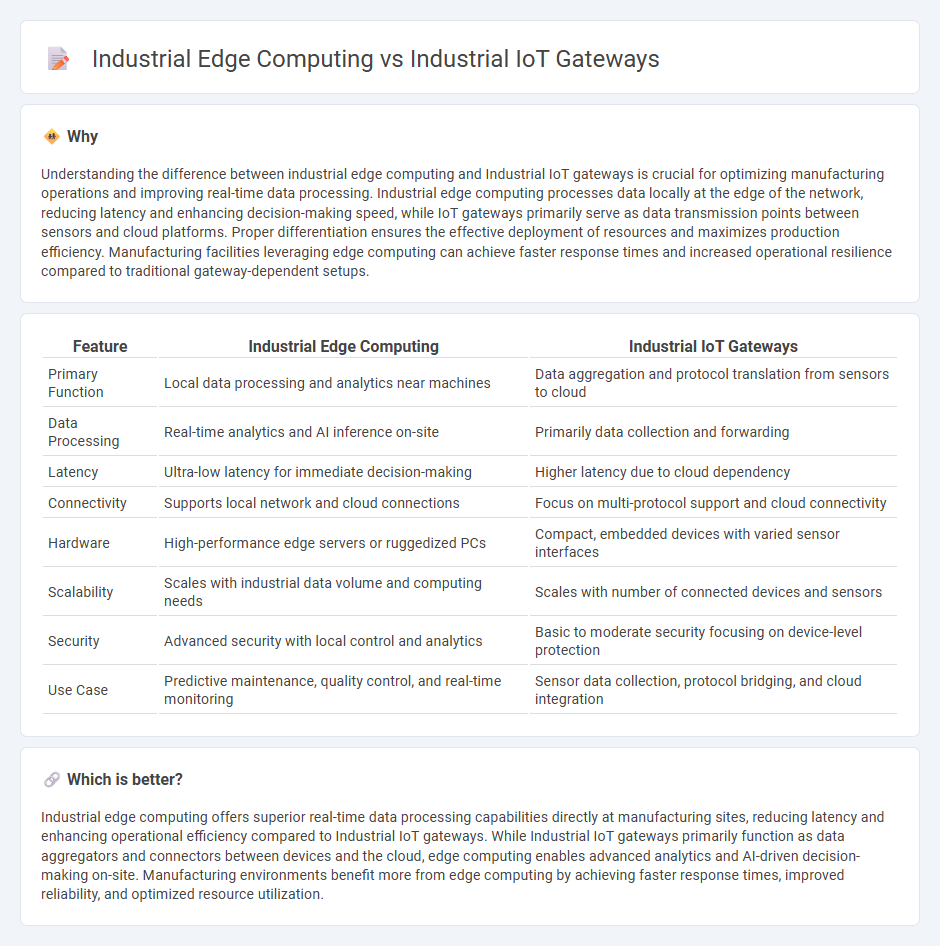
Industrial edge computing processes data locally on manufacturing equipment to reduce latency and enhance real-time decision-making, while Industrial IoT gateways aggregate and transmit data from multiple sensors to centralized cloud systems for broader analytics. Edge computing supports critical applications by enabling faster response times and improved operational efficiency in smart factories. Explore the differences and benefits of these technologies to optimize your manufacturing processes.
Why it is important
Understanding the difference between industrial edge computing and Industrial IoT gateways is crucial for optimizing manufacturing operations and improving real-time data processing. Industrial edge computing processes data locally at the edge of the network, reducing latency and enhancing decision-making speed, while IoT gateways primarily serve as data transmission points between sensors and cloud platforms. Proper differentiation ensures the effective deployment of resources and maximizes production efficiency. Manufacturing facilities leveraging edge computing can achieve faster response times and increased operational resilience compared to traditional gateway-dependent setups.
Comparison Table
| Feature | Industrial Edge Computing | Industrial IoT Gateways |
|---|---|---|
| Primary Function | Local data processing and analytics near machines | Data aggregation and protocol translation from sensors to cloud |
| Data Processing | Real-time analytics and AI inference on-site | Primarily data collection and forwarding |
| Latency | Ultra-low latency for immediate decision-making | Higher latency due to cloud dependency |
| Connectivity | Supports local network and cloud connections | Focus on multi-protocol support and cloud connectivity |
| Hardware | High-performance edge servers or ruggedized PCs | Compact, embedded devices with varied sensor interfaces |
| Scalability | Scales with industrial data volume and computing needs | Scales with number of connected devices and sensors |
| Security | Advanced security with local control and analytics | Basic to moderate security focusing on device-level protection |
| Use Case | Predictive maintenance, quality control, and real-time monitoring | Sensor data collection, protocol bridging, and cloud integration |
Which is better?
Industrial edge computing offers superior real-time data processing capabilities directly at manufacturing sites, reducing latency and enhancing operational efficiency compared to Industrial IoT gateways. While Industrial IoT gateways primarily function as data aggregators and connectors between devices and the cloud, edge computing enables advanced analytics and AI-driven decision-making on-site. Manufacturing environments benefit more from edge computing by achieving faster response times, improved reliability, and optimized resource utilization.
Connection
Industrial IoT gateways serve as critical nodes that aggregate, filter, and transmit data between manufacturing devices and industrial edge computing platforms, enabling real-time analytics and decision-making at the source. These gateways facilitate seamless connectivity across sensors, machines, and control systems, reducing latency and bandwidth usage while enhancing operational efficiency. By integrating with industrial edge computing, IoT gateways support predictive maintenance, asset tracking, and process optimization in smart manufacturing environments.
Key Terms
Data Aggregation
Industrial IoT gateways specialize in data aggregation by collecting, filtering, and transmitting sensor data from multiple devices to central cloud platforms, reducing network latency and bandwidth usage. Industrial edge computing enhances this process by not only aggregating data but also performing real-time analytics and decision-making at the edge, closer to the data source, thus improving operational efficiency and response times. Explore how leveraging these technologies can optimize your data aggregation strategy and industrial operations.
Real-time Processing
Industrial IoT gateways facilitate data collection and protocol translation between field devices and cloud platforms, enabling efficient data transfer but with limited real-time processing capabilities. Industrial edge computing enhances real-time processing by performing analytics, machine learning, and decision-making closer to the data source, reducing latency and improving operational responsiveness. Explore how integrating industrial edge computing can transform your real-time data handling for smarter manufacturing outcomes.
Localized Analytics
Industrial IoT gateways serve as communication hubs, aggregating data from sensors and devices to transmit it to centralized systems, while industrial edge computing processes data locally at the source to enable real-time, localized analytics. This localized data analysis reduces latency, enhances decision-making speed, and improves operational efficiency in manufacturing environments. Explore the latest advancements in industrial edge computing technology to optimize your industrial IoT infrastructure.
Source and External Links
Industrial IoT Gateways - Industrial IoT gateways act as bridges between machine data and cloud services, enabling data collection, standardization, and enhanced connectivity for production monitoring and automation.
Top Industrial IoT Gateways for 2025 - Features a list of top industrial IoT gateways, including models like Red Lion FlexEdge DA50D and Moxa MGate 5105-MB-EIP, designed to facilitate communication between various industrial networks.
Compulab IoT Edge Gateways - Compulab offers highly customizable and cost-effective IoT edge gateways used in diverse applications such as HVAC control and factory automation.
 dowidth.com
dowidth.com